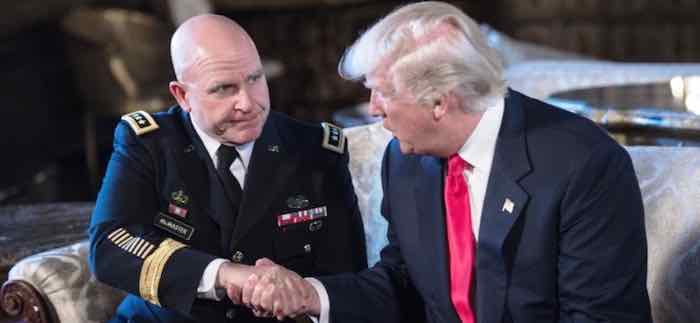A look at an old and little known endorsement of a problematic book…
More Evidence that McMaster Shares Obama’s Views on Islam and Terror
 By Raymond Ibrahim —— Bio and Archives March 17, 2017
By Raymond Ibrahim —— Bio and Archives March 17, 201715 Comments | Print Friendly | Subscribe | Email Us

Donald Trump’s new national security advisor, Lt. General H.R. McMaster, has made troubling remarks—such as “the Islamic State is not Islamic”—that one expects from the D.C. establishment. However, a hearty endorsement that he gave to a 2010 book points to the totality of McMaster’s views on security issues as being worse than simply his parroting politically correct memes on Islam.
The book in question is Militant Islamist Ideology: Understanding the Global Threat. Written by CDR Youssef Aboul-Enein, it was published by the Naval Institute Press in 2010. I read and reviewed it back in 2012 and found its claims—many of which the Obama administration followed to disastrous results—to be incorrect and problematic.
It is the Militant Islamists who are our adversary. They represent an immediate threat to the national security of the United States. They must not be confused with Islamists [p.2].This theme, which the author often expresses in convoluted language—at one point urging readers to appreciate “the divisions between Militant Islamists and between Militant Islamists and Islamists” (p.176)—permeates the book. In reality, all Islamists share the same ultimate goal of global Islamic hegemony. They differ only in methodology—not in their view of us as the enemy to be crushed.
“Non-militant Islamists,” chief among them the Muslim Brotherhood, see incremental infiltration and subtle subversion of infidel Western states as more effective than outright terrorism, as one notorious Brotherhood memo clearly states. 1
We’ve already seen the outcome of cooperating with “Non-militant Islamists” during the Arab Spring. The Obama administration cast aside decades of standard U.S. policy and support for secular Arab autocrats and made cozy with the Muslim Brotherhood. What followed is well-known: the Arab Spring quickly turned into the “Islamic Winter.” This culminated with the rise of the Islamic State, in large part due to Obama’s policies, both active (aiding Islamic terrorists by portraying them as “freedom fighters” in Libya and Syria) and inactive (pulling all U.S. forces out of Iraq despite the warnings and disposing of a 30-year ally of the U.S., the secularist Mubarak, for the Brotherhood in Egypt).
Not only is such a double-standard un-American—would a serviceman be punished for the “desecration” of any other religious book?—but the very idea that supremacist Muslims can be won over through servile and fawning appeasement is antithetical to reality, if not human nature. Abject behavior breeds contempt and encourages more Muslim aggression and demands.
Here are a few more examples of Aboul-Enein’s false claims, distortions, and general oddities, though one could go on and on:
- He writes (p.142) that “when Muslims are a persecuted minority Jihad becomes a fard kifaya (an optional obligation), in which the imam authorizes annual expeditions into Dar el Harb (the Abode of War), lands considered not under Muslim dominance.” This is wrong on several levels. A fard kifaya is not an “optional obligation”—an oxymoron if ever there was one—but rather a “communal obligation.” Moreover, Aboul-Enein is clearly describing Offensive Jihad, which is designed to subjugate non-Muslims and is obligatory to wage whenever Muslims are capable, not “when Muslims are a persecuted minority,” which in Islamic jurisprudence is a Defensive Jihad and fard ‘ain (i.e., individual obligation).
- He says (p.75) that the Arabic word for “terrorist” (irhabi) is nowhere to be found in the Koran or Hadith—without bothering to mention that the verb form of that word (tirhibun), “terrorize,” abounds in Islamic scriptures (e.g., Allah himself calls on Muslims to “terrorize” Islam’s opponents in Koran 8:60).
- He asserts (p.65) that “militant Islamists dismiss ijmaa [consensus] and qiyas [analogical reasoning]” two tools of Islamic jurisprudence. This is simply false. Groups like al-Qaeda and ISIS regularly invoke ijmaa (for instance, the consensus that jihad becomes a personal duty—fard ‘ain—when infidels invade the Islamic world) and justify suicide attacks precisely through qiyas (see The Al Qaeda Reader, p.138).
- After rightfully admonishing readers not to rely on skewed or biased accounts of Islam and Muhammad’s biography, he repeatedly recommends (e.g., pgs. 20, 213, 216) the writings of Muslim apologist extraordinaire Karen Armstrong, whose whitewashing of all things Islamic is notorious.
Continued below...
Such are the claims, distortions, and recommendations of a book that McMaster wholeheartedly endorsed in 2010 as “excellent” and “deserv[ing] a wide readership,” a book that claims “[t]errorist organizations use a narrow and irreligious ideology to recruit undereducated and disenfranchised people to their cause”—yet another tired apologia that has been repeatedly debunked. 2
Over a year ago I closed an article for Hoover Institution’s Strategika with the following sentence:
From around the web
Such are the claims, distortions, and recommendations of a book that McMaster wholeheartedly endorsed in 2010 as “excellent” and “deserv[ing] a wide readership,” a book that claims “[t]errorist organizations use a narrow and irreligious ideology to recruit undereducated and disenfranchised people to their cause”—yet another tired apologia that has been repeatedly debunked. 2
Over a year ago I closed an article for Hoover Institution’s Strategika with the following sentence:
Time will tell whether the next [American presidential] administration will remain willfully ignorant of the nature of its jihadi enemy—which is fatal in war according to Sun Tzu’s ancient dictum, “know your enemy”—or whether reality will trump political correctness.The pun remains truer than ever: If the recommendations of Militant Islamist Ideology reflect the views of Trump’s new national security advisor on U.S. security and Islam—especially this notion of cooperating with “Nonmilitant Islamists”—then it seems we are going right back to being “willfully ignorant” of reality.
- Excerpt follows: Understanding the role of the Muslim Brother in North America:
“The process of settlement is a “Civilization-Jihadist Process” with all the word means. The Ikhwan [meaning Muslim Brotherhood] must understand that their work in America is a kind of grand Jihad in eliminating and destroying the Western civilization from within and “sabotaging” its miserable house by their hands and the hands of the believers so that it is eliminated and God’s religion is made victorious over all other religions.”
“Without this level of understanding, we are not up to this challenge and have not prepared ourselves for Jihad yet. It is a Muslim’s destiny to perform Jihad and work wherever he is and wherever he lands until the final hour comes, and there is no escape from that destiny except for those who chose to slack.” - Here is McMaster’s entire endorsement, as it appears on the back of the book’s jacket cover:
“Terrorist organizations use a narrow and irreligious ideology to recruit undereducated and disenfranchised people to their cause. Understanding terrorist ideology is the first and may also be the most important step in ensuring national and international security against the threat that these organizations pose.
Youssef Aboul-Enein’s book is an excellent starting point in that connection.Militant Islamist Ideology deserves a wide readership among all those concerned with the problem of transnational terrorism, their ideology, and our efforts to combat those organizations that pose a serious threat to current and future generations of Muslims and non-Muslims alike.”
Raymond Ibrahim -- Bio and Archives | Click to view 15 CommentsRAYMOND IBRAHIM (RaymondIbrahim.com) is a widely published author, public speaker, and Middle East and Islam expert. His books include Crucified Again: Exposing Islam’s New War on Christians (2013) and The Al Qaeda Reader (2007). His writings, translations, and observations have appeared in a variety of publications, including Fox News, Financial Times, Jerusalem Post, Los Angeles Times, New York Times Syndicate, United Press International, USA Today, Washington Post, Washington Times, and Weekly Standard; scholarly journals, including the Almanac of Islamism, Chronicle of Higher Education, Jane’s Islamic Affairs Analyst, Middle East Quarterly, and Middle East Review of International Affairs; and popular websites, such as American Thinker, the Blaze, Bloomberg, Christian Post, FrontPage Magazine, Gatestone Institute, the Inquisitr, Jihad Watch, NewsMax, National Review Online, PJ Media, VDH’s Private Papers, and World Magazine. He has contributed chapters to several anthologies and been translated into various languages.






No comments:
Post a Comment